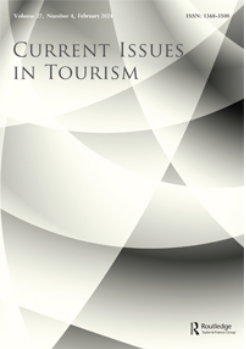居民能否吸引潜在游客成为“微观”和“纳米”的影响者?
IF 4.6
3区 管理学
Q1 HOSPITALITY, LEISURE, SPORT & TOURISM
引用次数: 0
摘要
【摘要】社交媒体使居民成为目的地信息传播的积极的共同创造者,从而使旅游业发生了革命性的变化。本研究探讨将社交媒体影响者视为居民是否可以增加地方识别并促进主客关系。我们评估了一个概念模型,该模型假设了自我影响者一致性、对地点的认同、与居民的情感团结、地点知识和访问意图之间的关系。该研究在线收集了996名关注“微”或“纳米”网红的中国TikTok用户的数据。结果显示,追随者的理想自我与网红的个人形象之间的一致性可以导致对网红居住地的认同感和与居民的情感团结,从而有助于访问意愿。此外,多群体分析证实了地方知识的调节作用。本研究对旅游营销理论和实践具有重要意义。关键词:网红营销居民情感团结与地方认同披露声明作者未报告潜在利益冲突。本研究得到海南省自然科学基金资助[批准号:721QN224]。本文章由计算机程序翻译,如有差异,请以英文原文为准。
Can residents engage potential tourists as ‘micro’ and ‘nano’ influencers?
ABSTRACTSocial media has revolutionized the tourism industry by making residents more active co-creators in destination information dissemination. This study explores whether recognizing social media influencers as residents can increase place identification and boost host–guest relationships. We assess a conceptual model that postulates relationships between self–influencer congruence, identification with a place, emotional solidarity with residents, place knowledge, and visit intention. Data were collected online from 996 Chinese TikTok users who follow ‘micro’ or ‘nano’ influencers. The results reveal that perceived congruence between a follower’s ideal self and an influencer’s personal image can lead to a sense of identification with the influencer’s residential place and emotional solidarity with residents, thereby contributing to visit intention. Further, multi-group analysis confirmed the moderating role of place knowledge. This study has important implications for tourism marketing theories and practices.KEYWORDS: Influencer marketingresidentsemotional solidarityidentification with place Disclosure statementNo potential conflict of interest was reported by the author(s).Additional informationFundingThis work was supported by Hainan Provincial Natural Science Foundation of China [grant number 721QN224].
求助全文
通过发布文献求助,成功后即可免费获取论文全文。
去求助
来源期刊

Current Issues in Tourism
HOSPITALITY, LEISURE, SPORT & TOURISM-
CiteScore
15.50
自引率
10.00%
发文量
230
期刊介绍:
Journal metrics are valuable for readers and authors in selecting a publication venue. However, it's crucial to understand that relying on any single metric provides only a partial perspective on a journal's quality and impact. Recognizing the limitations of each metric is essential, and they should never be considered in isolation. Instead, metrics should complement qualitative reviews, serving as a supportive tool rather than a replacement. This approach ensures a more comprehensive evaluation of a journal's overall quality and significance, as exemplified in Current Issues in Tourism.
 求助内容:
求助内容: 应助结果提醒方式:
应助结果提醒方式:


